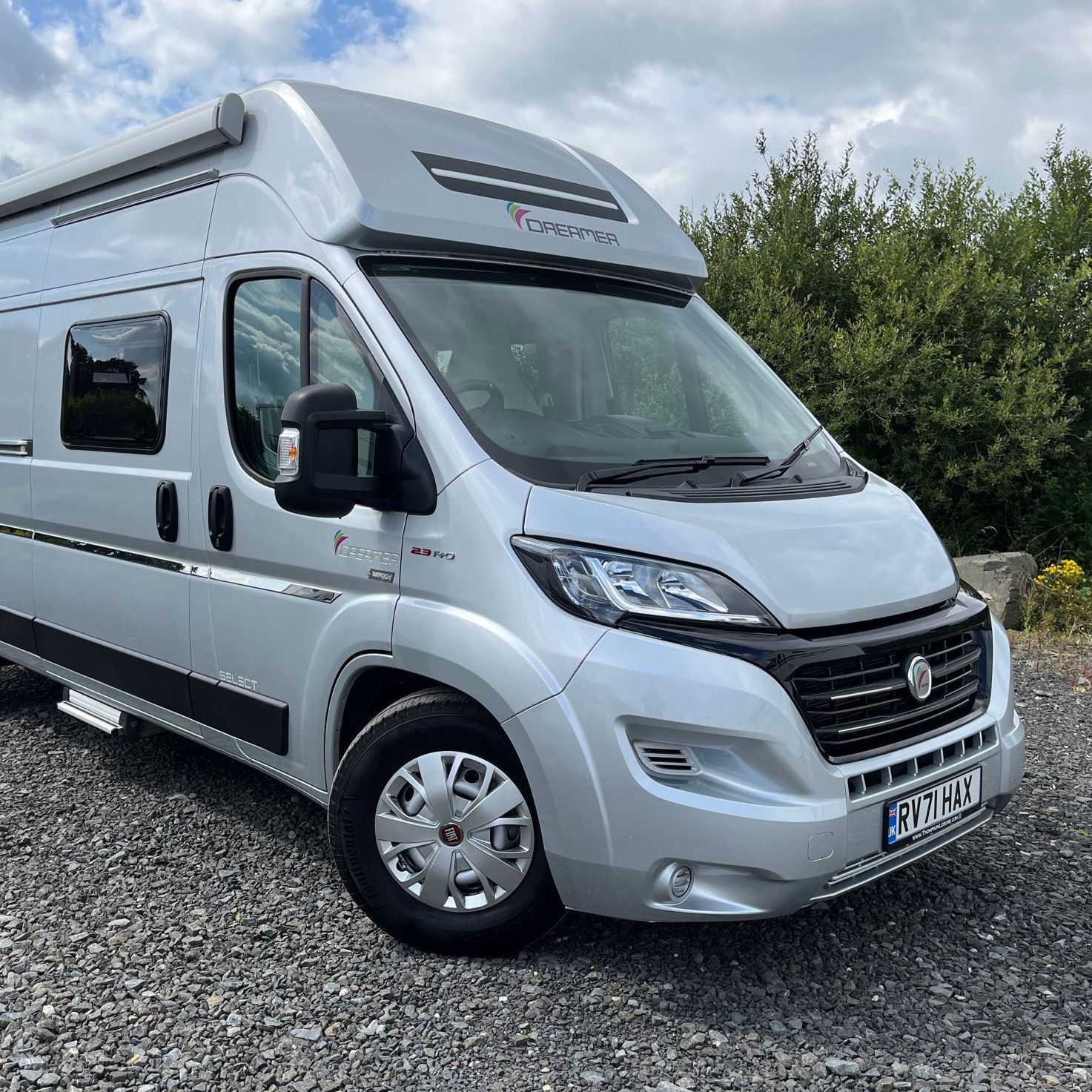RV & motorhome electrical system upgrades
Looking to take your RV or motorhome beyond the campground? Its easy to upgrade your existing system to be an off-grid explorer!
designed each year
off-grid electrics*

GBEA Awards 22 & 23
Why upgrade your RV or motorhome system?
Motorhomes are an incredibly well rounded versatile vehicle, unbeatable for hoping between campgrounds…but take away the shore power hook up and your fancy home on wheels can become a frustrating burden.
Motorhomes are overwhelmingly designed to be used with a grid connection, so you can recharge the typically tiny leisure battery and provide on demand 230V AC power for us europeans and 120V AC power for our friends over the pond.
As van conversion advocates, we have to hold our hands up and admit that an RV or motorhome is a smart investment. One simple payment gives you instant access to cheap holidays and you don’t need to spend thousands of hours building something yourself. If you can afford the initial investment, RV and motorhome depreciation is actually very good and often represents a real world saving if the RV or motorhome replaces the typical expensive holiday cottage or hotel get away.
So why upgrade your RV or motorhome electrical system? Most motorhomes leave the showroom with a single solar panel on the roof, often less than 100W, simply to but a tick ✅ on the spec sheet and deceive those not yet familiar with off-grid electrics that this will somehow magically recharge their system. The reality is a single 100W panel glued flat to the roof will often never generate enough voltage to pass any charge to your batteries.
Most systems will be platformed on a battery charger system, which allows AC power to pass through to your sockets or receptacles when you are plugged in to a site connection and convert this AC power to DC to recharge your leisure batteries. However this won’t allow you to use your AC products and appliances off-grid, even if you switched the battery charger for a combined inverter/charger the rest of the system wouldn’t be able to support the increased power usage.
The good news is, upgrading your existing system, doesn’t need to be complicated or even expensive. Our experts have helped hundreds of people upgrade their RV or motorhomes system to let them explore beyond the campsite or simply break up long journeys staying off-grid. The return on investment is quick if you ditch that expensive Caravan & Camping Club or KOA site and opt to stay off-grid 😉
Customer story 🚐
Pete Hudson Dreamer D68 motorhome
Pete upgrades his factory fitted motorhome electrics to explore beyond the campsite and still use his beloved coffee machine.
Tell us about your plans to upgrade your motorhome electrics
Having ordered a new Dreamer D68 Campervan in summer 2021 we had to wait around 18 months for it to be finally delivered due to ongoing supply problems. I stipulated no ‘extras’ on delivery as I wanted to tackle a Victron based off grid supplementary installation on it. This was to be in two stages to enable us to tour off grid indefinitely and independent of campsites for our electrical needs.
In this waiting period I read everything there is to read on the Nohma website and digested their articles and rationales regarding different power set ups. Its important to note that I knew relatively nothing of campervan electrics installation initially although watching numerous YouTube vids (some good, some dodgy) I’d gained a good appreciation of what I wanted to achieve in the new van. I contacted Charlie via the website and sent her and the team a few in depth emails basically putting over my thoughts and ideas of what I wanted.
I’d read Nohma’s reviews and thought as a bare minimum I’d like these guys to paw over my ideas and advise me if they were electrically achievable but more importantly safe!

No matter what size of adaptation or install you are about to tackle, I’d personally recommend you have Nohma on your side from the start.
Pete Hudson, Dreamer D68 Motorhome
What changes in an RV or motorhome upgrade?
Stripping the entire existing out of your RV or motorhome can be extremely messy and 99% of the time simply isn’t necessary, instead we try to keep the original control unit and infrastructure the same and add capability to work in harmony with the rest of the system.
You may be asking it that stage, what exactly needs to change, but this depends on the existing specification of your system and the requirements you have for the new one. Thankfully or team of engineers have helped countless people with all manner of motorhomes and RV’s upgrade their system, so even when something new crops up they are well versed in finding a solution.
There are however common themes and changes that customers wish to make, which we have discussed below, as well as some pitfalls.
Batteries 🔋
Often people see a battery upgrade as a golden bullet to give them increased capacity and ability to spend more time off-grid. However simply increasing your leisure battery bank size without adjusting your recharging methods is a bit like having a paddling pool with a big hole in it (representing your power usage) and only a small hose to refill it (your recharge method). The size of the paddling pool may temporarily provide more power, but due to the limited recharge capacity and ongoing power drainage, you’ll consistently find yourself in a deficit. It is also often the most expensive method to extend your time off-grid, when compared to the ever decreasing cost of solar.
Lithium batteries are also often heralded as an easy solution and whilst in some circumstances and surrounded by other upgraded systems they can be, simply opting for a “drop in replacement for your lead acid battery” will not help you. This statement has been a favourite among lithium battery retailers trying to make a quick sale, but it’s a very misleading statement.
Switching from lead-acid to lithium batteries for your leisure battery is not as straightforward as it may seem, primarily because lithium and lead-acid batteries have fundamentally different charging profiles and require distinct equipment for recharging. Lead-acid batteries, for instance, typically handle a slower and more prolonged charging process, while lithium batteries can often accept a much higher charge rate, necessitating more advanced and often more expensive charging equipment. Additionally, lithium batteries usually require a specific type of charger that can handle their unique voltage and amperage requirements, as well as manage their more complex balance and temperature needs. This means that simply replacing a lead-acid battery with a lithium one without updating the corresponding charging infrastructure could lead to inefficient charging and even potential damage to the new battery.
Solar ☀️
For large RV’s or motorhomes utilising the substantial roof space for solar is often a no brainer, and given the ever decreasing cost of solar panels the inclusion of an additional or replacement solar array is likely on the cards if you want to spend more time off-grid. Exactly how big the array needs to be can only be established once we understand how you will use your vehicle, what you want to power and crucially, where and when you want to travel. When we remove the guesswork, we save our customers on average £562 ($700 USD) by calculating exactly what they need.
Battery to battery charging 🚐
Motorhomes and RVs frequently employ Voltage Sensitive Relays (VSRs) as part of their electrical systems, largely because they are traditionally designed to work with lead-acid batteries. VSRs are effective for this purpose as they automatically connect or disconnect the battery system based on voltage levels, ensuring the lead-acid batteries are charged efficiently during vehicle operation. However, when transitioning to lithium batteries, the charging requirements change significantly. Lithium batteries have different charging profiles and demand a more precise management system, necessitating the use of a Battery-to-Battery (B2B) charger. B2B chargers are specifically designed to handle the unique charging characteristics of lithium batteries, providing the right voltage and current, and ensuring the battery is charged safely and efficiently.
Even if a motorhome or RV is already equipped with a B2B charger or has lithium batteries installed, modifications to the existing B2B sub-system might still be necessary. This is because the capabilities of lithium batteries often exceed those of lead-acid batteries, and the existing B2B system may not be optimised to exploit the full potential of the new batteries. Adjustments to the specifications of the B2B system, such as upgrading to a higher capacity or a more advanced model, could be required to align with the increased performance and efficiency offered by lithium batteries. This ensures that the entire electrical system of the motorhome or RV is harmonised and operates at its optimum, thus delivering the best possible performance and longevity from the lithium batteries.
Inverter or inverter/charger 🔌
Incorporating an inverter or an inverter/charger into the electrical system of an RV or motorhome is a significant upgrade, enhancing the versatility and independence of the vehicle. This addition allows for the use of AC appliances while off-grid, providing the convenience of using the same sockets or outlets that are typically reliant on shore power. The inverter transforms the DC power stored in the vehicle’s batteries into AC power, enabling the operation of everyday appliances such as televisions, microwaves, and laptops, just as if they were connected to a mains electricity supply.
An inverter/charger serves a dual purpose. Not only does it convert DC to AC power for appliance use, but it also charges the vehicle’s batteries when connected to an external AC power source, like a shore hook-up. This dual functionality makes it an efficient and space-saving solution for power management in the motorhome. It ensures that batteries are kept optimally charged when external power is available, and when off-grid, it provides the necessary AC power for a comfortable and convenient living environment. This integration represents a significant leap in self-sufficiency for RV and motorhome users, allowing for a more flexible and enjoyable off-grid experience.
DC power ⚡
This is the easy bit – unless your requirements to power 12V loads such as lights and even fridges dramatically change we can continue to utilise your existing system, so nothing needs to be ripped out and re-wired.
Control systems 📟
Motorhomes and RV control systems otherwise known as habitation control systems encompass features like climate control, lighting, and water systems management, which are pivotal for a seamless and comfortable travel experience. Common options, such as the Truma Combi heating system, the Dometic FreshJet air conditioner, and the Thetford toilet systems can all be integrated within a central control unit. Integrating electrical system upgrades not only enhance off-grid performance but also ensure that these fundamental comforts and conveniences are maintained, or even augmented. By smartly integrating traditional control systems with modern, off-grid capable electrical upgrades, we can create a harmonious blend of functionality that facilitates off-grid living.
Power up your adventures.
💯 Empower your journey: Upgrade your motorhome to excel off-grid and discover a world less travelled.
🔥 Enjoy the luxuries of home wherever you travel. Keep your wine chilled with endless renewable power.
🌎 Upgrading your system doesn’t need to cost the world and can add real value to your investment.
The only thing keeping you up at night should be your view of the stars ⭐ Our systems are designed to BS 7671 & NFPA 70 by qualified engineers.
Why use Nohma?
Without help, 99.4% of people will get their electrical system wrong†. Our clever software uses 200+ calculations & parameters to design your system, so you can leave the electrics to the experts.
†Results from our Nohma electrical system survey. Discover more.
Campervan electrics leaving you confused?


